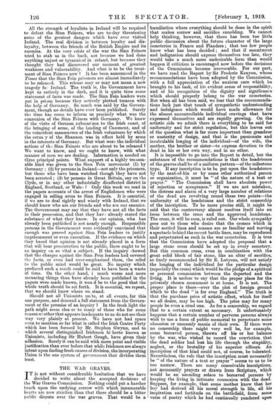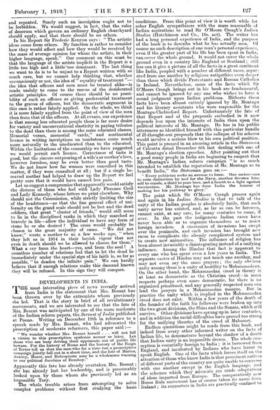THE WAR GRAVES.
IT is not without considerable hesitation that we have decided to write about the accepted decisions of the War Graves Commission. Nothing could put a harsher touch upon the undying sorrow with which innumerable hearts are now stricken than that there should be a bitter public dispute over the war graves. That would be a
humiliation where everything should be done in the spirit that makes sorrow and sacrifice ennobling. We cannot help thinking, however, that there has been too little public discussion about the future character of the large cemeteries in France and Flanders ; that too few people know what has been decided ; and that if resentment and indignation should express themselves too late, they would take a much more undesirable form than would happen if criticism is encouraged now before the decisions of the Commission become irrevocable. For onr part, we have read the Report by Sir Frederic Kenyon, whose recommendations have been adopted by the Commission, with a full appreciation of the anxious care which he brought to his task, of his evident sense of responsibility, and of his recognition of the dignity and significance which should properly belong to the war cemeteries. But when all has been said, we fear that the recommenda- tions lack just that touch of sympathetic understanding and indulgence which would have made allowance for the almost uncontrollable individual cravings that have expressed themselves and are rapidly growing. On the artistic side we admit there is everything to be said for uniformity and for strict regulation, but this leaves out of the question what is far more important than grandeur or austerity of design, and that is the passionate and incalculable longing of the individual—of the wife, the mother, the brother or sister—to express devotion to the dead in his or her own way, and in no other.
It is impossible to go into the Report in detail, but the substance of the recommendations is that the headstones of the graves shall be of a uniform pattern—of the milestone type. If any inscription is to be put upon the headstones by the next-of-kin or by some other authorized person or organization, it must be " of the nature of a text or prayer." " The Commission shall have absolute power of rejection or acceptance." If we are not mistaken, the distress and alarm of a very large number of relations of the dead are revolving round these two points—the uniformity of the headstones and the strict censorship of the inscription. To be more precise still, it might be said that the controversy almost resolves itself into an issue between the cross and the approved headstone. The cross, it will be seen, is ruled out. Our whole sympathy goes out to those who desire that the crosses which in their serried lines and masses are so familiar and moving a spectacle behind the recent battle lines, may be reproduced and perpetuated as such in the war cemeteries. It is true that the Commission have adopted the proposal that a large stone cross should be set up in every cemetery. But this common cross, even in combination with the great solid block of fair stone, like an altar of sacrifice, so finely reoommended by Sir E. Lutyens, will not satisfy the longing of the individual for the particular design (especially the cross) which would be the pledge of a spiritual or personal communion between the departed and the living. It is useless to say that the proper );lace for the privately chosen monument is at home. It is not. The proper place is there—over the plot of foreign ground which to the dead " is for ever England." The truth is that the purchase price of artistic effect, which for itself we all desire, may be too high. The price may for many people be even a cruel one. As for a censorship, we regard that to a certain extent as necessary. It unfortunately happens that a certain number of perverse persons always wish to use a form of public memorial to perpetuate some obsession or unseemly mania of their own. If there were no censorship there might very well be, for example, some bereaved person, thrown off his or her balance by the war, who wished to record the conviction that the dead soldier had lost his life through the stupidity, neglect, or the brutality of his superior officers. An inscription of that kind could not, of course, be tolerated. Nevertheless, the rule that the inscription must necessarily be " of the nature of a text or prayer " seems to us to be too narrow. There are many conceivable inscriptions, not necessarily prayers or drawn from Scripture, which would be an unending solace to bereaved persons by keeping the living in intimate connexion with the dead. Suppose, for example, that some mother knew that hex boy had derived all his moral strength in life, all his inspiration and fortitude on the battlefield, from some verse of poetry which he had continually pondered upon
and repeated. Surely such an inscription ought not to be forbidden. We would suggest, in fact, that the rules of decorum which govern an ordinary English churchyard should apply, and that there should be no others. In his Report Sir Frederic Kenyon says : " The artistic ideas come flora others. My function is rather to consider how they would affect and how they would be received by the mass of average opinion for whom the artists, in their higher language, speak." Our comment on this must be that the language of the artists implicit in the Report is a little too high and a little too dominant. The last thing we want to do is to be unjust to a Report written with so much care, but we cannot help thinking that, whether unconsciously or not, the idea of " equality of treatment "- the idea that officers and men must be treated alike—is made unduly to come to the rescue of the desiderated artistio principles. Of course there should be no possi- bility of such an offence as giving preferential treatment to the graves of officers, but the democratic argument in this case is rather falsely applied. On the whole, we think it is more falsely applied from the point of view of the men than from that of the officers. At all events, our experience is that among less educated people there is far more desire for variety and unconventional elasticity in paying tributes to the dead than there is among the more educated classes. Memorial verses, memorial " cards," and sentimental licence in writing inscriptions on tombstones come much more naturally to the uneducated than to the educated. Within the limitations of the censorship wo have suggested we would permit such licence. Correctness of taste is good, but the sincere outpouring of a wife's or mother's love, however formless, may be even better than good taste. We do not know how far women were consulted in this matter, if they were consulted at all ; but if a single be- reaved mother had helped to draw up the Report we feel pretty sure that it would have caused less pain. Let us suggest a compromise that apparently would satisfy the distress of those who feel with Lady Florence Cecil and Lady Kennedy, whose letters we print elsewhere. Why should not the Commission, while stnctly limiting the size of the headstones—so that the fine general effect of uni- formity on the grand scale should not be lost and the dead soldiers, that great " cluster of friends," would still seem to lie in the disciplined ranks in which they marched so bravely in life—allow the individual to have any form of stone he or she desired ? The cross would probably be chosen in the great majority of cases. " We did not know," wrote a mother to us a few weeks ago, " when they left us in 1914 in their boyish vigour that not even in death should we be allowed to choose for them." What a cry from the heart—yes, and from the soul I A countless number of relations feel that to let the dead he immediately under the special sign of his faith is, so far as possible, "to deaden the infinite pain." We can hardly believe that if enough relations make this demand known they will be refused. In this sign they will conquer.



































 Previous page
Previous page